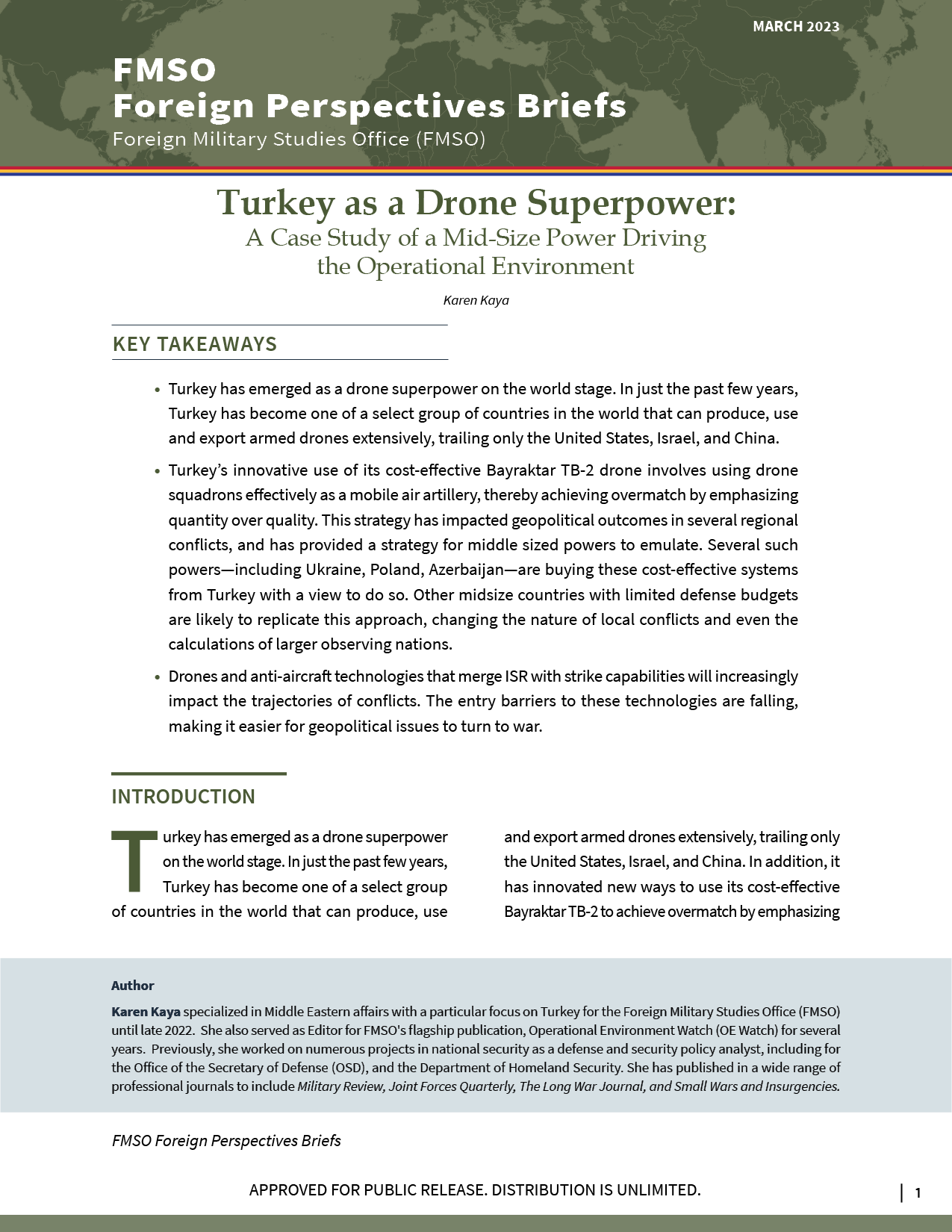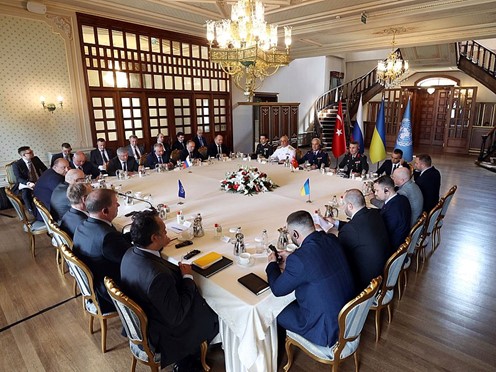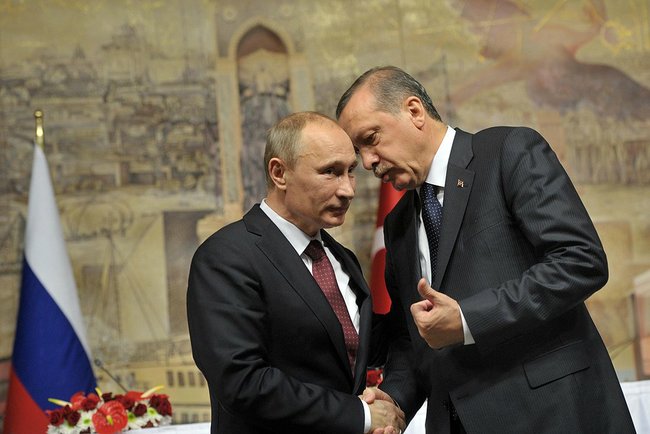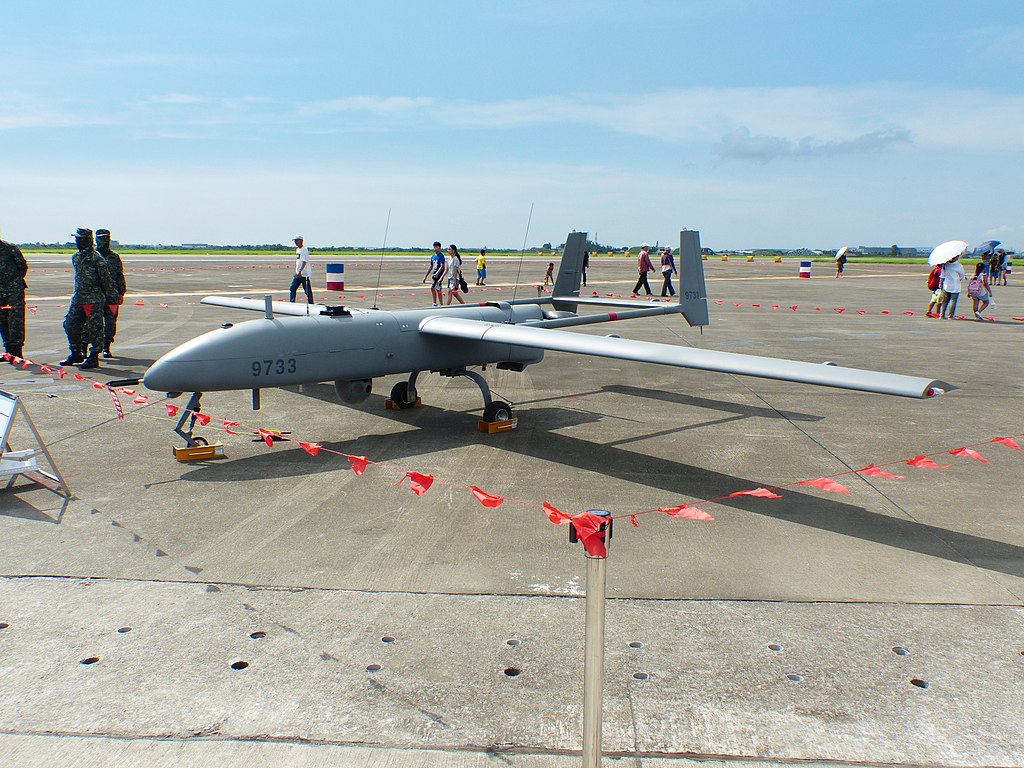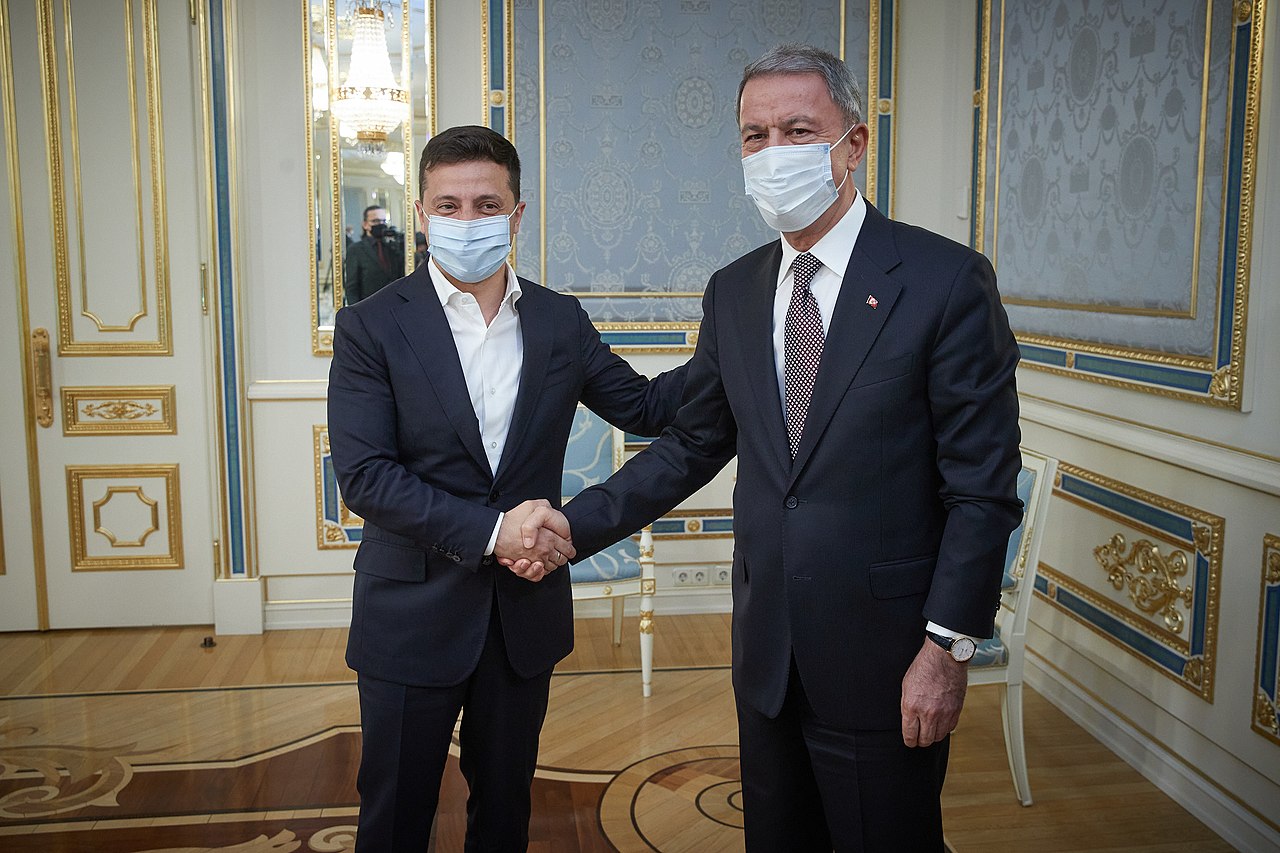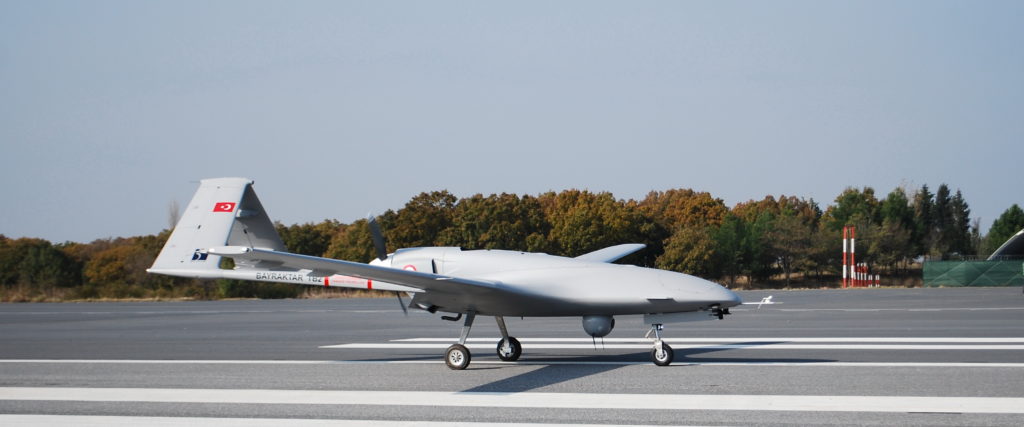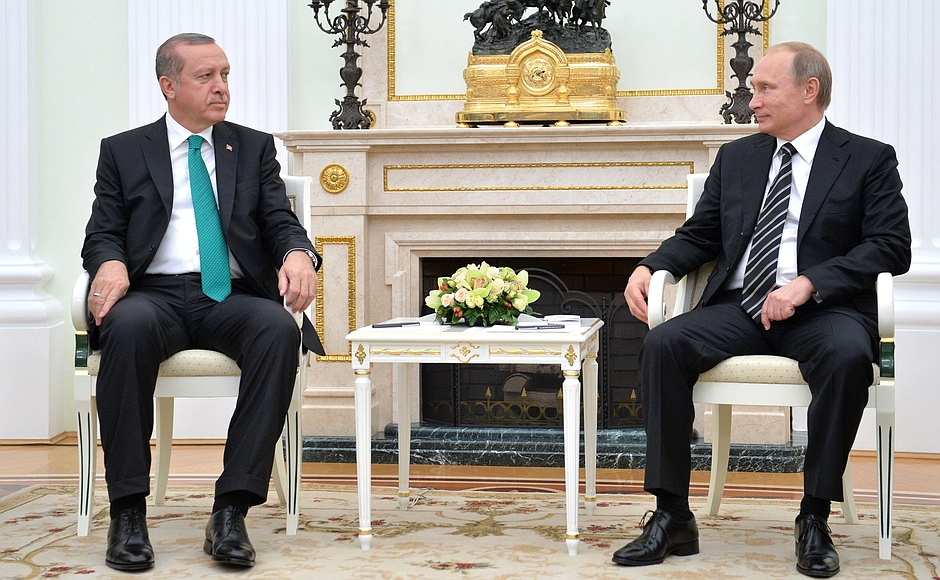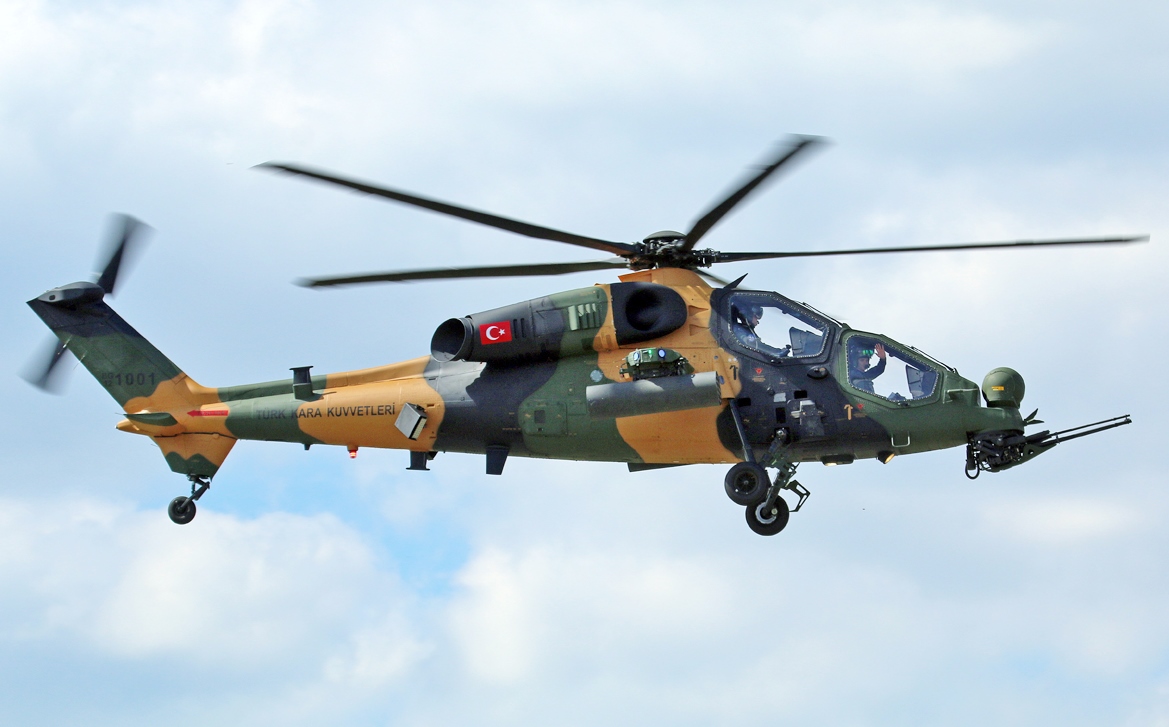Albatross 9733 Display at Gangshan Air Force Base.
“Ukraine has demonstrated [drones’] effectiveness in asymmetric warfare… It is a lesson that has not been lost on Taiwan.”
Appearing to take note of Ukraine’s success in using Turkish-made Bayraktar TB-2 drones, Taiwan is considering the value of small and cost-effective drones to protect its own territory in the face of a Chinese attack.[i] The accompanying passages report on Taiwanese drone producers’ efforts to develop indigenous, cost-effective drones, and a recent agreement between Taiwanese and Turkish drone researchers to cooperate and exchange information on doing so. In contrast to numerous countries that are purchasing the Bayraktar TB-2 drones from Turkey, Taiwan wants to develop indigenous drones of its own, based on the lessons learned from the use of TB-2s in different conflicts.[ii] Perhaps the most notable lesson for Taiwan from the war in Ukraine is the ability to achieve overmatch by deploying large numbers of small, cost-effective drones.[iii]
As the first accompanying article from Taiwan’s national news agency Focus Taiwan reports, Taiwan’s domestic drone producers are working on several small and cheap drones, including the Albatross II, which is effectively a Taiwanese TB-2 with a longer range of 250 km. There is also the Flyingfish drone, which reportedly costs less than $3,000, making it cost effective to deploy in large numbers in urban or naval warfare. The passage quotes the drone’s developer as saying, “When the enemy approaches [Taiwan’s] coastal waters, the Flyingfish drones will prove to be a formidable weapon for asymmetric combat, because they are so easy to use and can be used in great numbers.”
The second excerpted article, from Turkey’s oldest secular newspaper, Cumhuriyet, discusses a recent agreement between Turkish and Taiwanese institutions that conduct research and development on drone technology. It reports that Gebze Technical University, which conducts research on drone technology, and Turkey’s Fly BVLOS Technology, which conducts drone pilot trainings and produces world-class drones, participated in the “Taiwan-Turkey UAV Technology Forum” held in Chiayi, Taiwan in August. Chiayi is home to Taiwan’s new, state-run drone research and development center. The two Turkish institutions signed an agreement with Taiwan Formosa University, which conducts academic research in drone technology, to encourage and strengthen academic-technical exchange and cooperation in the field of UAV technology.
Sources:
Sean Lin, “Asymmetrical warfare focus has Taiwan drone companies upping the ante,” Focus Taiwan (Taiwan’s national news agency), 10 September 2022. https://focustaiwan.tw/sci-tech/202209100016
Ukraine has demonstrated [drones’] effectiveness in asymmetric warfare as it blunts the advances of more numerous Russian forces, deploying Turkish-made Bayraktar TB2 drones and Switchblade suicide drones donated by the U.S. to attack targets and gain intelligence. It is a lesson that has not been lost on Taiwan, itself threatened by a larger neighbor and committed to a defense strategy centered on asymmetrical warfare.
At the inauguration of a state-run drone research and development (R&D) center in Chiayi County last month, President Tsai Ing-wen pledged to support drone research to strengthen the country’s asymmetric combat capabilities. But it is domestic drone producers, eager to upgrade the first-generation of domestically made drones Taiwan currently possesses, that could offer the quickest shot in the arm to Taiwan’s defenses.
JC Tech President Robert Cheng said his company now has built and tested prototypes of a suicide drone called the Flyingfish… Costing less than US$3,000, the Flyingfish 200 has a much lower price point than cruise missiles or other combat drones, making it cost effective to deploy in large numbers in urban or naval warfare, he said… “When the enemy approaches [Taiwan’s] coastal waters, the Flyingfish drones will prove to be a formidable weapon for asymmetric combat, because they are so easy to use and can be used in great numbers,” Cheng said.
Meanwhile, aviation company GEOSAT, which began developing drones in 2008, has been collaborating with the National Chung-Shan Institute of Science and Technology (NCSIST) — Taiwan’s state-run weapons developer and manufacturer — on the Albatross II drone… The GEOSAT CEO believed that the Albatross II, which is compatible with locally developed Sky Sword air-to-air missiles and 2.75-inch rockets, could outperform the Bayraktar TB2 drones, which gained fame for sinking the Russian cruiser Moskva in the Russia-Ukraine war.
Su Tzu-yun, an analyst at the Institute for National Defense and Security Research, said… suicide drones… can be used to great effect when targeting smaller PLA ships during amphibious warfare, and military drones can be used in place of radar stations should the latter be destroyed to keep command centers informed of what is happening on the front lines of combat… Su agreed with Cheng on the power and importance of numbers… The combination of different drones will “allow Taiwan to amass a sizable arsenal of precision strike munitions to counter the PLA’s numerical advantage, greatly leveraging the efficacy of Taiwan’s armed forces in defending the nation,” Su said.
“Türkiye ile Tayvan arasında İHA iş birliği (Drone Cooperation between Turkey and Taiwan),” Cumhuriyet (the oldest secular Turkish daily newspaper), 11 August 2022. https://www.cumhuriyet.com.tr/dunya/turkiye-ile-tayvan-arasinda-iha-is-birligi-1968257
Gebze Technical University, which conducts research on drone technology and Fly BVLOS Technology [which conducts UAV pilot trainings and produces world-class UAVs]… participated in the “Taiwan-Turkey UAV Technology Forum” held in Chiayi, Taiwan, [and] signed an agreement with Taiwan Formosa University to encourage and strengthen academic-technical exchange and cooperation in the field of UAV technology. With the agreement, Fly BVLOS Technology became a partner of UAV Technology Center, headquartered in Taiwan and working in the field of UAV technology. [The sides] will carry out R&D activities together… especially for products such as motors, chips and batteries. In addition, all stakeholders will share their expertise and experience in the field of UAV technologies. While Gabze Technical University and Fly BVLOS transfer their experience in UAV production to Taiwan, they will also benefit from the work of Taiwan Formasa University, an important technology manufacturer, and its partner UAV Technology Center.
Fly BVLOS Founder Kamil Demirkapu said: “Turkey… has come to an important place in the world with the breakthroughs it has made in various fields from R&D to production. As everyone knows very well, some of the best UAVs in the world are produced by Turkish engineers. Gabze Technical University, together with the logistics and aviation sectors of the future, will change the entire commercial life. … With this agreement, the experience of Taiwan Formosa University, which has carried out valuable academic studies in the field of UAV technology, will also join these two very strong partners from Turkey. With this cooperation, we aim to contribute both to our country’s R&D and production activities in the field of UAVs and to make Turkey’s expertise and experience more visible in the international community by signing important research and innovations in the sector.”
Notes:
[i] See: Karen Kaya, “Turkish-Made Bayraktar TB2 Drones Play Important Role in Ukraine,” OE Watch, Issue 6, 2022.
[ii] See: Karen Kaya, “Turkey as a Drone Superpower: A Case Study of a Mid-Size Power Driving the Operational Environment,” Foreign Military Studies Office, September 2022. https://community.apan.org/wg/tradoc-g2/fmso/m/fmso-monographs/421179
[iii] See: “Turkey and the TB-2: A Rising Drone Superpower with Karen Kaya,” Army Mad Scientist Convergence Podcast, September 2022. https://podcasts.apple.com/us/podcast/65-turkey-and-the-tb-2-a-rising-drone/id1495100075?i=1000579565167
Image Information:
Image: Albatross 9733 Display at Gangshan Air Force Base
Source: https://commons.wikimedia.org/wiki/File:NCSIST_Albatross_9733_Display_at_Gangshan_Air_Force_Base_Apron_20170812a.jpg
Attribution: Public Domain

